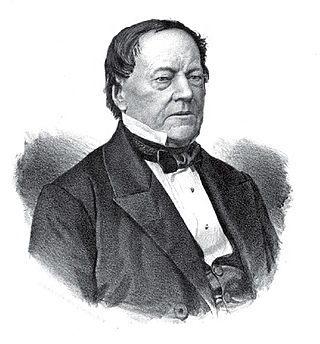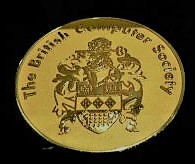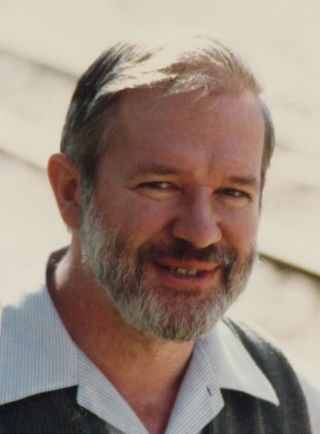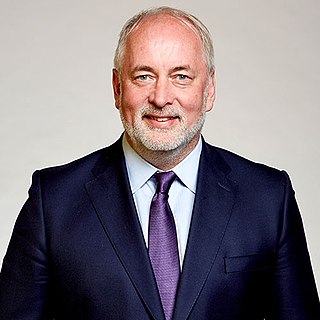
Augusta Ada King, Countess of Lovelace was an English mathematician and writer, chiefly known for her work on Charles Babbage's proposed mechanical general-purpose computer, the Analytical Engine. She was the first to recognise that the machine had applications beyond pure calculation.

The analytical engine was a proposed mechanical general-purpose computer designed by English mathematician and computer pioneer Charles Babbage. It was first described in 1837 as the successor to Babbage's difference engine, which was a design for a simpler mechanical calculator.

Computer science is the study of computation, information, and automation. Computer science spans theoretical disciplines to applied disciplines. Though more often considered an academic discipline, computer science is closely related to computer programming.

Charles Babbage was an English polymath. A mathematician, philosopher, inventor and mechanical engineer, Babbage originated the concept of a digital programmable computer.

A difference engine is an automatic mechanical calculator designed to tabulate polynomial functions. It was designed in the 1820s, and was first created by Charles Babbage. The name, the difference engine, is derived from the method of divided differences, a way to interpolate or tabulate functions by using a small set of polynomial co-efficients. Some of the most common mathematical functions used in engineering, science and navigation, are built from logarithmic and trigonometric functions, which can be approximated by polynomials, so a difference engine can compute many useful tables.

The Difference Engine (1990) is an alternative history novel by William Gibson and Bruce Sterling. It is widely regarded as a book that helped establish the genre conventions of steampunk.

Howard Hathaway Aiken was an American physicist and a pioneer in computing, being the original conceptual designer behind IBM's Harvard Mark I computer.

The history of computing is longer than the history of computing hardware and modern computing technology and includes the history of methods intended for pen and paper or for chalk and slate, with or without the aid of tables.

Pehr (Per) Georg Scheutz was a Swedish lawyer, translator, and inventor, who is now best known for his pioneering work in computer technology.

The Lovelace Medal was established by the British Computer Society in 1998, and is presented to individuals who have made outstanding contributions to the understanding or advancement of computing. It is the top award in computing in the UK. Awardees deliver the Lovelace Lecture.

Jonathan P. Bowen FBCS FRSA is a British computer scientist and an Emeritus Professor at London South Bank University, where he headed the Centre for Applied Formal Methods. Prof. Bowen is also the Chairman of Museophile Limited and has been a Professor of Computer Science at Birmingham City University, Visiting Professor at the Pratt Institute, University of Westminster and King's College London, and a visiting academic at University College London.

The Computer Conservation Society (CCS) is a British organisation, founded in 1989. It is under the joint umbrella of the British Computer Society (BCS), the London Science Museum and the Manchester Museum of Science and Industry.

The history of computer science began long before the modern discipline of computer science, usually appearing in forms like mathematics or physics. Developments in previous centuries alluded to the discipline that we now know as computer science. This progression, from mechanical inventions and mathematical theories towards modern computer concepts and machines, led to the development of a major academic field, massive technological advancement across the Western world, and the basis of a massive worldwide trade and culture.

Allan George Bromley was an Australian historian of computing who became a world authority on many aspects of early computing and was one of the most avid collectors of mechanical calculators.
Events from the year 1843 in the United Kingdom.

Melina Sydney Padua is a graphic artist and animator based in London, England. She is the author of The Thrilling Adventures of Lovelace and Babbage steampunk comic, and her animation work appears in several popular Hollywood films.

James Essinger is a freelance writer and British author of numerous financial and business management books, but he is better known for his non-fiction books. These include Spellbound: The Improbable Story of English Spelling and his popular science book on the history of computing, Jacquard's Web. Essinger is also the author, with Jovanka Houska, of The Mating Game, a novel set in the world of chess, and of a Young Adult thriller, Josh Moonford and the Lost City of Cantia.

Nicholas Robert Jennings is a British computer scientist and the current Vice-Chancellor and President of Loughborough University. He was previously the Vice-Provost for Research and Enterprise at Imperial College London, the UK's first Regius Professor of Computer Science, and the inaugural Chief Scientific Adviser to the UK Government on National Security. His research covers the areas of AI, autonomous systems, agent-based computing and cybersecurity. He is involved in a number of startups including Aerogility, Contact Engine, Crossword Cyber Security, and Reliance Cyber Science. He is also an adviser to Darktrace, a member of the UK Government's AI Council, chair of the National Engineering Policy Centre and a council member for the Engineering and Physical Sciences Research Council.

The Thrilling Adventures of Lovelace and Babbage: The (Mostly) True Story of the First Computer is a steampunk graphic novel written and drawn by Sydney Padua. It features Ada Lovelace and Charles Babbage in an alternative universe where they have successfully built an Analytical Engine and use it to "fight crime".
Robert Anthony Hyman (1928–2011) was a British historian of computing.

















